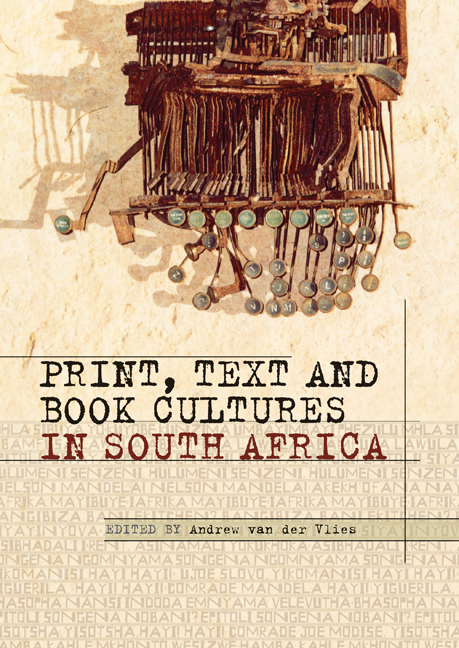Book contents
- Frontmatter
- Contents
- Acknowledgements
- Abbreviations and acronyms
- 1 Introductory
- 2 Print Cultures and Colonial Public Spheres
- 2.1 Metonymies of Lead: Bullets, Type and Print Culture in South African Missionary Colonialism
- 2.2 “Spread Far and Wide over the Surface of the Earth”: Evangelical Reading Formations and the Rise of a Transnational Public Sphere: The Case of the Cape Town Ladies’ Bible Association
- 2.3 Textual Circuits and Intimate Relations: A Community of Letters across the Indian Ocean
- 3 Local/Global: South African Writing and Global Imaginaries
- 4 Three Ways of Looking at Coetzee
- 5 Questions of the Archive and the Uses of Books
- 6 Orature, Image, Text
- 7 Ideological Exigencies and the Fates of Books
- 8 New Directions
- Contributors
- Index
2.3 Textual Circuits and Intimate Relations: A Community of Letters across the Indian Ocean
from 2 - Print Cultures and Colonial Public Spheres
Published online by Cambridge University Press: 21 April 2018
- Frontmatter
- Contents
- Acknowledgements
- Abbreviations and acronyms
- 1 Introductory
- 2 Print Cultures and Colonial Public Spheres
- 2.1 Metonymies of Lead: Bullets, Type and Print Culture in South African Missionary Colonialism
- 2.2 “Spread Far and Wide over the Surface of the Earth”: Evangelical Reading Formations and the Rise of a Transnational Public Sphere: The Case of the Cape Town Ladies’ Bible Association
- 2.3 Textual Circuits and Intimate Relations: A Community of Letters across the Indian Ocean
- 3 Local/Global: South African Writing and Global Imaginaries
- 4 Three Ways of Looking at Coetzee
- 5 Questions of the Archive and the Uses of Books
- 6 Orature, Image, Text
- 7 Ideological Exigencies and the Fates of Books
- 8 New Directions
- Contributors
- Index
Summary
So you cannot shake off your Archives habit!! You are regularly keeping carbon copies of your letters and perhaps filing my stuff! For some future archivist to unearth and publish and start theories of the intimate relations between South Africa and India!!
P. Kodanda Rao to M. K. Jeffreys, 23 August 1930It is nearly a month since I left India. I wonder if the continuity of our correspondence has been broken. I hope not. I do not want to lose the prize if an enterprising “Daily Mail” starts a prize for the longest continuous correspondence between two persons other than of a business nature. Why not you suggest the idea to some South African paper. That beats cross word puzzles and chess!
P. Kodanda Rao to M. K. Jeffreys, 14 May 1931An extraordinary epistolary exchange, criss-crossing the Indian Ocean in the late 1920s and early 1930s and animated by the circulation of literary texts forms the focus of this exploration into textual circuits and intimate relations in the late imperial world. My dramatis personae—Marie Kathleen Jeffreys, V. S. Srinivasa Sastri and P. Kodanda Rao—played remarkable roles in the theatres of empire, decolonisation and nation building during this charged era, while in the process briefly producing a community across the Indian Ocean. The prophetic comment made by Rao to Jeffreys in a letter of August 1930 dispatched from London, where he and Sastri were attending a round-table conference on Indian independence, invites the inquiry I undertake here; it shifts this epistolary exchange from the private domain to the public, authorising the trespass into the intimate and affective sphere that this study performs, and eliciting readings that approach the political via the personal.
Employed at the Archives in Cape Town, Jeffreys expended much of her life tracing the texture of her city in literary, sociological and historical accounts. I have argued elsewhere for the past and present significance of these writings that conceptualise the Cape as a creole crucible in an oceanic crossroads at the tip of Africa (see Distiller & Samuelson 2005; Samuelson 2007; 2011).
- Type
- Chapter
- Information
- Print, Text and Book Cultures in South Africa , pp. 87 - 108Publisher: Wits University PressPrint publication year: 2012



